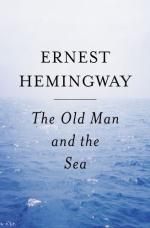|
This section contains 5,916 words (approx. 20 pages at 300 words per page) |

|
SOURCE: "The Old Man and the Sea: A Nietzschean Tragic Vision," in Dalhousie Review, Vol. 61, No. 4, Winter, 1981-82, pp. 631-43.
In the following essay, Taylor rejects previous assessments of the novella as a parable of sin and punishment, asserting instead that the old man's struggle can be seen in terms used by the philosopher Friedrich Nietzsche — as an affirmation of life in the highest manner, as a recognition that to do what "must be done," a human being should "go far out," as Santiago has.
In studying The Old Man and the Sea one finds a very comforting consistency. From the initial reading two elements distinguish Santiago and his adventure from Hemingway's earlier heroes. Many have noted the positive character of Santiago's struggle, its natural context in direct contrast to the forced, artificial violence of bullfights and safaris. Santiago is also the only hero who, as Melvin Backman...
|
This section contains 5,916 words (approx. 20 pages at 300 words per page) |

|


